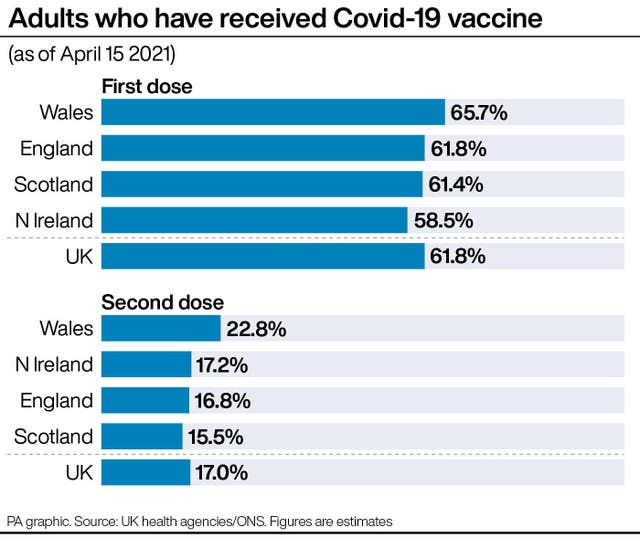Pregnant women should be offered a Covid-19 jab at the same time as the rest of the population based on their age and clinical risk group, according to new official advice.
The Joint Committee on Vaccination and Immunisation (JCVI) said there were “no specific safety concerns” identified with “any brand of Covid-19 vaccines” in relation to pregnancy.
Covid-19 jabs had previously only been offered to pregnant women when their risk of exposure to the virus is high, such as health workers, or if a woman has underlying conditions placing her at higher risk of Covid-19 complications.
The JCVI said data from the US showed around 90,000 pregnant women had received jabs, mainly the Pfizer-BioNTech and Moderna vaccines, “without any safety concerns being raised”.
As a result, the JCVI said it advises that it is “preferable” for pregnant women in the UK to be offered these two vaccines where available.
It added: “There is no evidence to suggest that other vaccines are unsafe for pregnant women, but more research is needed.”
It is understood that the Pfizer-BioNTech and Moderna vaccines are considered preferable because they are the jabs for which safety information relating to pregnant women is available, whereas there is not as much relevant data on other jabs such as the AstraZeneca vaccine.
Professor Wei Shen Lim, Covid-19 chair for JCVI, said: “We encourage pregnant women to discuss the risks and benefits with their clinician – those at increased risk of severe outcomes from Covid-19 are encouraged to promptly take up the offer of vaccination when offered.

“There have been no specific safety concerns from any brand of Covid-19 vaccines in relation to pregnancy.
“There are more real-world safety data from the US in relation to the Pfizer-BioNTech and Moderna vaccines in women who are pregnant – therefore, we advise a preference for these to be offered to pregnant women.”
Dr Mary Ramsay, head of immunisation at Public Health England (PHE), said: “The available data on the Pfizer-BioNTech and Moderna vaccines provide confidence that they can be offered safely to pregnant women.
“The Covid-19 vaccines continue to save thousands of lives and it is important that we encourage as many people as possible to take up the offer when it is their turn.”
The JCVI said it still advises pregnant women to discuss the risks and benefits of being vaccinated with their clinician.
It added that, although uncommon, severe illness due to Covid-19 is more likely in later pregnancy.
Pregnant women with symptomatic Covid-19 infection are two to three times more likely to give birth prematurely, the JCVI said.
It explained that the “greatest risk factor” for severe Covid-19 outcomes is age, “which is why pregnant women should be invited for vaccination along with their age or clinical risk group”.
“Women who are planning pregnancy, are in the immediate postpartum, or are breastfeeding can be vaccinated with any vaccine, depending on their age and clinical risk group,” the JCVI said.
The new advice was welcomed by the Royal College of Obstetricians and Gynaecologists (RCOG) and the Royal College of Midwives (RCM).
Professor Lucy Chappell, consultant obstetrician and Covid-19 vaccine lead for the RCOG, said: “This announcement from the JCVI brings the UK into line with the US and other countries who have been offering the Covid-19 vaccine to pregnant women since December, and should provide reassurance to pregnant women, as well as those planning a pregnancy or breastfeeding, that vaccination is an option for them.
“We are continuing to work with healthcare professionals so they are able to counsel pregnant women on the risks and benefits of having the Covid-19 vaccine based on their individual circumstances.”
She added that the RCOG was also advocating for more data collection on pregnant women receiving vaccines in the UK.
Dr Mary Ross-Davie, director for professional midwifery and Covid-19 vaccine lead at the RCM, said the advice “empowers pregnant women to make their own decisions about whether or not to receive the vaccine”.
“Ultimately it will be a woman’s choice and midwives and obstetricians will be there to support them to make an informed decision that is right for them,” she added.
“It is now vital that the national vaccination programme, GPs and maternity services are supported to develop systems and procedures that support women who wish to have the vaccine to have it as easily as possible.”
Helen Donovan, the Royal College of Nursing’s professional lead for public health nursing, said: “For ethical reasons, a vaccine trial involving pregnant women is not an option.
“But real-world data has now informed how we can take the UK’s Covid-19 vaccine programme further.
“We encourage women to talk to their midwife if they have any concerns around having the vaccine.”




Comments: Our rules
We want our comments to be a lively and valuable part of our community - a place where readers can debate and engage with the most important local issues. The ability to comment on our stories is a privilege, not a right, however, and that privilege may be withdrawn if it is abused or misused.
Please report any comments that break our rules.
Read the rules here